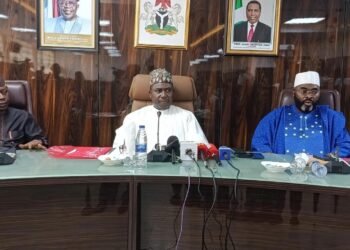The Presidency on Thursday explained why President Muhammadu Buhari remained silent when there were allegations of irregularities and compromise against the Independent National Electoral Commission, INEC, in the conduct of the February 25 presidential and National Assembly elections.
The Presidency also ruled out any decision that would result in the annulment of presidential elections, as was the case on June 12, 1992.
It advised any candidate or political party who is dissatisfied with the conduct and outcome of the election to seek redress in court.
These were contained in a report titled “At the 5th United Nations Conference on Least Developed Countries (LDCs), President Buhari drums up support for Asiwaju Bola Ahmed Tinubu’s Presidency” by Mallam Garba Shehu, Senior Special Assistant to the President on Media and Publicity.
Before the elections, President Buhari assured various local and international fora that the elections that would herald his exit from office would be credible, free, fair, and transparent, and that the outcome would reflect the will of the people in choosing who would lead them.
The passage of the Electoral Act, 2022, and the use of technology in the elections were indications that President Buhari was prepared to leave Nigeria with a transparent electoral process free of manipulations.
However, controversies have trailed the conduct and outcome of the February 25 presidential election, with the INEC accused of failing to strictly follow the Electoral Act in terms of transmitting results from the BIVAS to the iREV immediately after collation at the Pulling Units.
Former President Olusegun Obasanjo was the first to raise the alarm that the INEC had jeopardized the conduct of the election by failing to follow electoral laws, and in a statement, he urged President Buhari to summon the electoral umpire so that the country would not be thrown into political crisis.
There have also been a slew of negative reports from the international news media, casting doubt on the election’s conduct and claiming that it fell short of the expectations of the majority of voters.
However, the presidential spokesman stated that Buhari, while speaking to Nigerians in the Diaspora about the ongoing political transition, called for support for the incoming government of Asiwaju Tinubu, “so that Nigeria will continue to be the beacon of hope and prosperity in our continent and an example for other African countries to emulate.”
He further said, “In addition to other things, this trip, more than any other, speaks to the courage, political stamina and statesmanship with which the President has managed the affairs of the nation.
“In the buildup to the trip, he was faced with orchestrated attempts to poison public opinion against national institutions, particularly the presidential election and its conduct by the independent National Electoral Commission, INEC as an institution, against which vile and unsubstantiated allegations were hurled.
“The clear intent of this was creating an atmosphere of fear, polarizing the public and demonizing the administration of the President. The wishful thinkers appeared to assume that the June 12, 1993 election crisis, the worst ever since the Civil War could be recreated. Those who sought to do this forgot what the President said at the palace of the Gbong-Gwon Jos, when he went to the city to inaugurate the Tinubu-Shettima campaign: “this election will not be annulled; whoever is the winner will be president.,’’ he said.
He also said, “President Buhari not only muted himself following the cacophony, he picked up international travel: “Bola Tinubu’s election stands. If you are aggrieved, and you have the locus to do so, go to court.’’
Continuing, he said, “President Buhari used the opportunity of the visit to speak to his guests about the recent election in Nigeria and the fact that a new President would be taking over in less than three months. He hoped that the strong relations he had built between those countries will continue to endure in the new administration.
“The highlight of the conference for Nigeria was the national address on the theme of this year’s event “From Potential to Prosperity”, a speech that observers described as strikingly activist. In it, the President criticized the current structure of the global financial system which, he said, “places an unsustainable external debt burden on the most vulnerable countries.”
*(Courtesy, Vanguard Newspaper)










